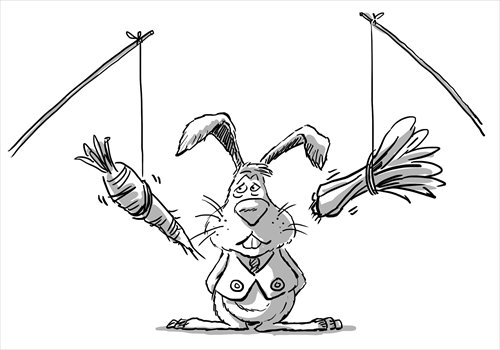Ukraine caught in tug of war with EU, Russia

Illustration: Liu Rui/GT
While Ukraine rejected the EU's "olive branch" to sign an accord of association at the end of 2013, it has assumed the presidency of the Commonwealth of Independent States (CIS) since the beginning of this year. Ukraine now is facing the thorny issue of how to deal with the Russia-dominated CIS. How to strike a balance between the EU and Russia, or how to side with one of them without inextricably alienating the other, will continue to perplex this country.
One month after Ukraine refused to sign the accord of association, Prime Minister Mykola Azarov demanded the government resume talks with the EU by the end of February. Azarov also said Ukraine should carry out concrete negotiations with the EU regarding the accord and the establishment of a free trade zone.
The next opportunity for Ukraine and the EU to sign the association agreement is the EU-Ukraine summit scheduled for March. This has brought hope to the almost shattered association accord.
Russia strongly objected to the integration of Ukraine and the EU. The key problem is the exclusive provisions in the Eastern Partnership scheme proposed by the EU. The EU hopes that through the accord of association and a free trade agreement, Ukraine will be separated from the CIS integration process led by Russia and be included in the EU's political and economic systems.
To counter the EU's geopolitical "offensive," Russia adopted economic means by providing huge loans and reducing the natural gas price, hoping to retain Ukraine in the CIS integration process, while the EU was not willing to provide urgent financial support to Ukraine. After the Vilnius summit in November, the stance of the Ukrainian government has changed.
Now, Ukraine has gained the initiative in resuming negotiations with the EU. On the one hand, President Viktor Yanukovych reiterated that the EU integration strategy is still the priority for his country's diplomacy, but on the other hand, he expressed concerns that the accord goes against the country's national interests. The remarks raised discontent from the EU leadership including José Manuel Barroso, president of the European Commission,
Meanwhile, Ukraine has paid back Russia economically. Yanukovych signed 14 cooperative agreements in December with Russian President Vladimir Putin. According to these agreements, Russia and Ukraine will carry out large-scale industrial integration projects. Russia also has opportunities of investing in Ukraine's industrial system.
Under such circumstances, if Ukraine signs with the accord of association with the EU, Russia will undoubtedly benefit, as Russian enterprises may have the chance to enter the European market.
After realizing Russia was behind Ukraine's refusal for the accord of association, the EU has showed mixed feelings. The EU was both angry and shocked. German Chancellor Angela Merkel criticized Russia's interference in EU-Ukraine relations. Former Polish president Aleksander Kwasniewski, now EU special envoy, accused EU diplomacy of a lack of decision-making and executive capabilities, and that the EU underestimated Putin's determination in Ukraine.
But meanwhile, the EU has showed willingness to continue cooperation with Ukraine. Martin Schulz, president of the European Parliament, said they would discuss the problem again and the EU would give the accord a second thought at both economic and political levels.
The geopolitical competition between Russia and Western countries over Ukraine is a long-term process. It seems that Russia has won in this round, but things are not that easy.
After the Cold War, the defined borders around eastern Europe by Brussels have been changing. Especially after Poland and the Baltic states joined the EU and NATO, new European countries have been pushing east so as to expand the EU's sphere of influence.
Those former Soviet republics, now independent, have no doubt become the EU's target, and its Eastern Partnership scheme is a touchstone for European-Russian relations.
As long as Russia is viewed as "the other" by the Western world, the EU and the US will not give up wooing former Soviet republics into their "democratic" system. The special geopolitical environment Ukraine is in determines that Ukraine will not escape the plight of choice any time soon.
The author is an associate research fellow at the Institute of Russian, Eastern European & Central Asian Studies of the Chinese Academy of Social Sciences. opinion@globaltimes.com.cn